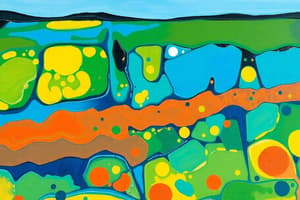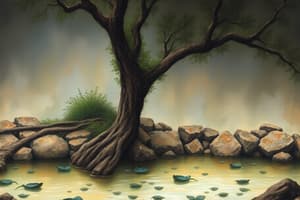Podcast
Questions and Answers
What is surface water?
What is surface water?
Water found on the surface of the Earth.
What is ground water?
What is ground water?
Water found below the surface of the Earth, usually stored in aquifers.
What is an aquifer?
What is an aquifer?
An underground layer of sand, gravel, or rock that holds water.
What is the water table?
What is the water table?
What is the saturated zone?
What is the saturated zone?
What is the unsaturated zone?
What is the unsaturated zone?
What is runoff?
What is runoff?
What is drawdown?
What is drawdown?
What is porosity?
What is porosity?
What is permeability?
What is permeability?
What is a confined aquifer?
What is a confined aquifer?
What is an unconfined aquifer?
What is an unconfined aquifer?
What does it mean to percolate?
What does it mean to percolate?
What is a recharge zone?
What is a recharge zone?
What is an artesian spring?
What is an artesian spring?
What is a piezometer?
What is a piezometer?
What is point source pollution?
What is point source pollution?
What is non-point source pollution?
What is non-point source pollution?
What is leachate?
What is leachate?
What is a well?
What is a well?
Study Notes
Water Definitions and Concepts
- Surface Water: Water located on the Earth's surface, encompassing rivers, lakes, and reservoirs.
- Ground Water: Water located beneath the Earth’s surface, primarily found in aquifers.
- Aquifer: An underground layer made of sand, gravel, or rock capable of storing water, crucial for water supply.
- Water Table: The upper limit of the saturated zone; the level at which soil or rock is fully saturated with water.
Zones within Ground Water
- Saturated Zone: Area where all spaces between soil and sediment are filled with water, vital for aquifer replenishment.
- Unsaturated Zone: Region above the saturated zone where spaces between particles contain air and are not fully water-saturated.
Water Movement and Impact
- Runoff: Water, primarily from rainfall, that flows over the land surface into bodies of water, affecting water quality and ecosystem health.
- Drawdown: The reduction in the water level in an aquifer due to excessive water extraction, impacting availability.
Key Aquifer Characteristics
- Porosity: The amount of empty spaces in soil/rock that can store liquids, impacting water availability.
- Permeability: Indicates how easily water can flow through soil, sediment, or rock, essential for groundwater movement.
Types of Aquifers
- Confined Aquifer: Encased by impenetrable layers, leading to pressurized conditions within, affecting water extraction.
- Unconfined Aquifer: No overlying dense layer; water levels are influenced directly by surface conditions.
Water Movement Processes
- Percolation: The process of water seeping down from the surface through various layers of soil and rock to reach an aquifer.
- Recharge Zone: The area where precipitation infiltrates the ground and replenishes the aquifer beneath.
Natural Water Features
- Artesian Spring: Occurs when pressurized groundwater flows naturally to the surface, creating a spring without pumping.
- Piezometer: A well used to measure water pressure and levels in aquifers, crucial for water resource management.
Pollution Types
- Point Source Pollution: Contamination originating from a single identifiable source, making it easier to target for remediation.
- Non-point Source Pollution: Pollution that comes from multiple, indistinct sources, complicating detection and management.
Environmental Concerns
- Leachate: Toxic liquid formed when water seeps through landfills, potentially harmful due to dissolved chemicals from waste materials.
- Well: A constructed hole used to access underground water supplies, essential for drinking water and irrigation.
These concepts form the foundation for understanding groundwater management and the importance of maintaining water quality and availability.
Studying That Suits You
Use AI to generate personalized quizzes and flashcards to suit your learning preferences.
Description
Test your knowledge with these flashcards on ground water terminology. This quiz covers essential definitions related to surface water, aquifers, and the water table. Perfect for students studying environmental science or geology!




